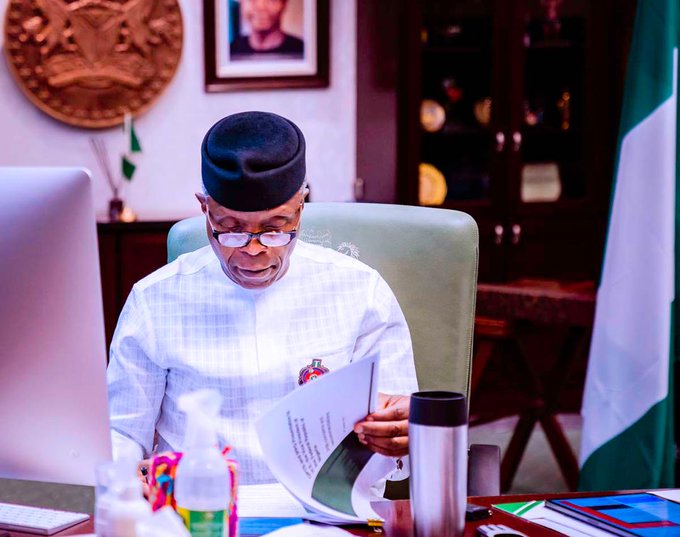Press Releases
Vice-President Yemi Osinbajo flags off N5,000 cash transfer to low-income earners in urban areas

Vice-President, Yemi Osinbajo has flagged off the cash transfer of N5,000 to low-income earners in urban areas, as part of efforts to ease the impact of COVID-19 on the economy.
The federal government is giving the low-income earners the money under the Rapid Response Register (RRR) and beneficiaries will receive the stipend for six months.
The target beneficiaries are “self-employed”, “wage employed” and “urban poor.”
The ministry of humanitarian affairs, using “cutting-edge” technology, had undertaken a pilot scheme where over 100,000 beneficiaries in Lagos and the federal capital territory (FCT) were captured.
Over 300,000 beneficiaries are said to have received the aforementioned sum the moment the scheme was launched.
Speaking at the virtual flag off of the RRR in Abuja on Tuesday, Osinbajo said this set of vulnerable people were not captured in the National Social Register (NSR).
“This category of people, who were not previously captured in the social register, the Ministry of Humanitarian Affairs, working with the National Social Safety-Nets Programme (NASSP), designed an intervention to rapidly identify, register and provide them with succour. Hence, the Rapid Response Register (RRR) was born,” the vice-president said.
“The RRR is designed to focus mainly on the urban poor wards selected using scientifically validated methods of satellite remote sensing technology, machine learning algorithm and big data analysis.
“This social protection method of targeting is the first strategy to be developed and tested in the Sub-Saharan Africa region and Nigeria will be the first country for its implementation.
“With the RRR, which uses a wholly technology-based approach, we are primed to achieve an end-to-end digital foot-print in cash transfers for the urban poor; which also helps us achieve our financial inclusion policy under the Enhancing Financial Innovation and Access programme (EFInA).
“The groundbreaking success of the RRR, now emboldens us to achieve our aspiration of a social security programme for a minimum of twenty million Nigerians in the next two years.”
Earlier, Sadiya Farouq, minister of humanitarian affairs, said there is a need for the government to ameliorate hardship of low-income earners in urban areas.
“One of my first charge to the National Social Safety-Nets Programme (NASSP) on assumption of office in 2019 was the digitization of Cash Transfer Programme to reduce fiduciary risks, while improving financial inclusion where feasible for the unbanked people on the National Social Register, most of whom are women,” Farouq said.
“Our experience during the COVID-19 pandemic reinforced this position, especially given the requirement of the COVID-19 protocols, as well as our inability to immediately reach the urban poor impacted by the pandemic.
“It became obvious very early into the pandemic crisis that we needed to establish a shock responsive system beyond just responding to the pandemic.
“We needed to develop the capacity for rapid response to any emergency, whether natural or man-made – such as the crisis of banditry, insurgencies, communal crisis and the emerging food crisis it sprouts, or the displacement arising thereof, and not least, future emergencies arising from climatic changes or similar pandemics.”






